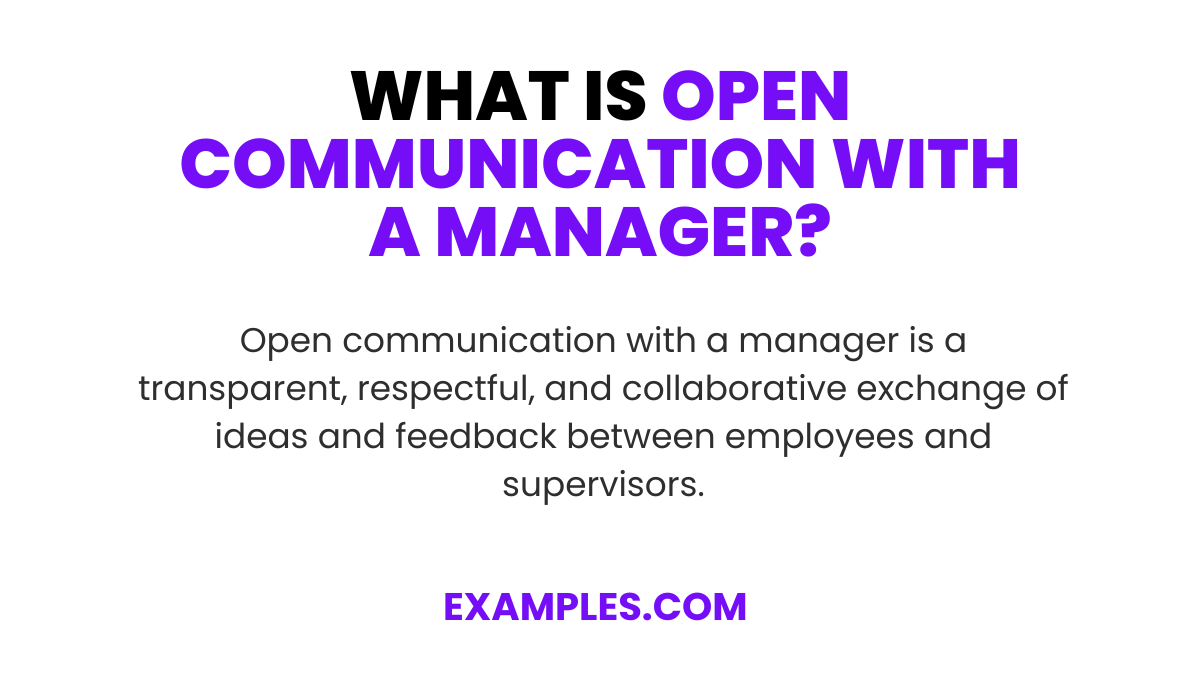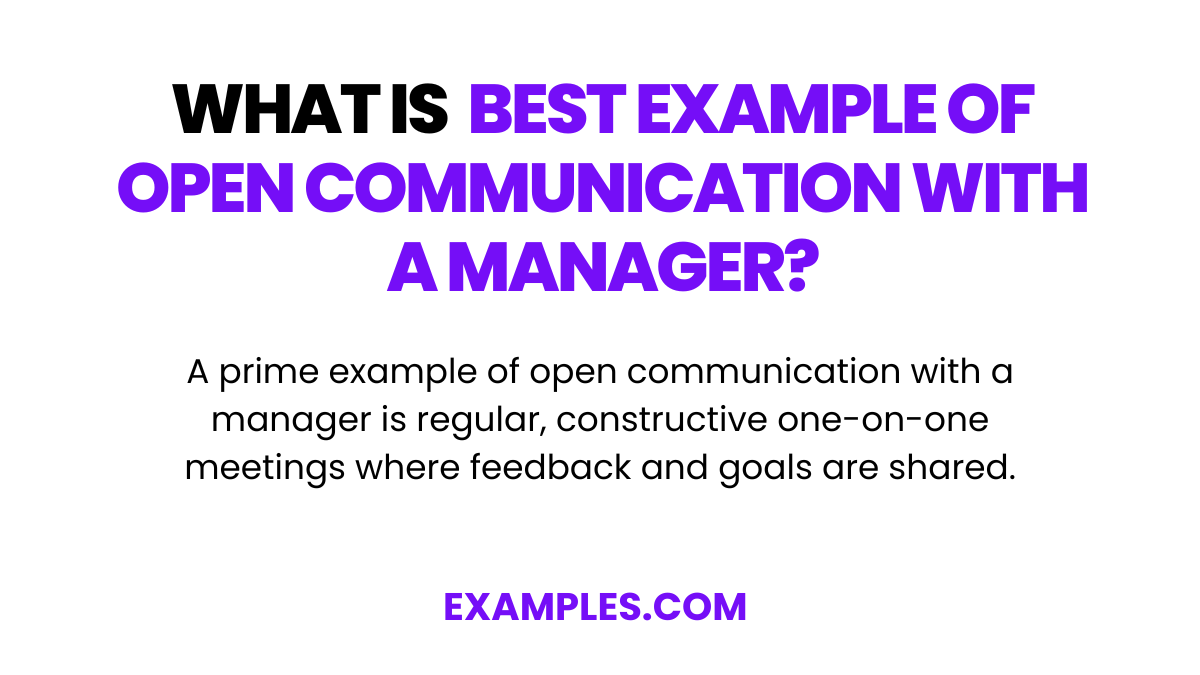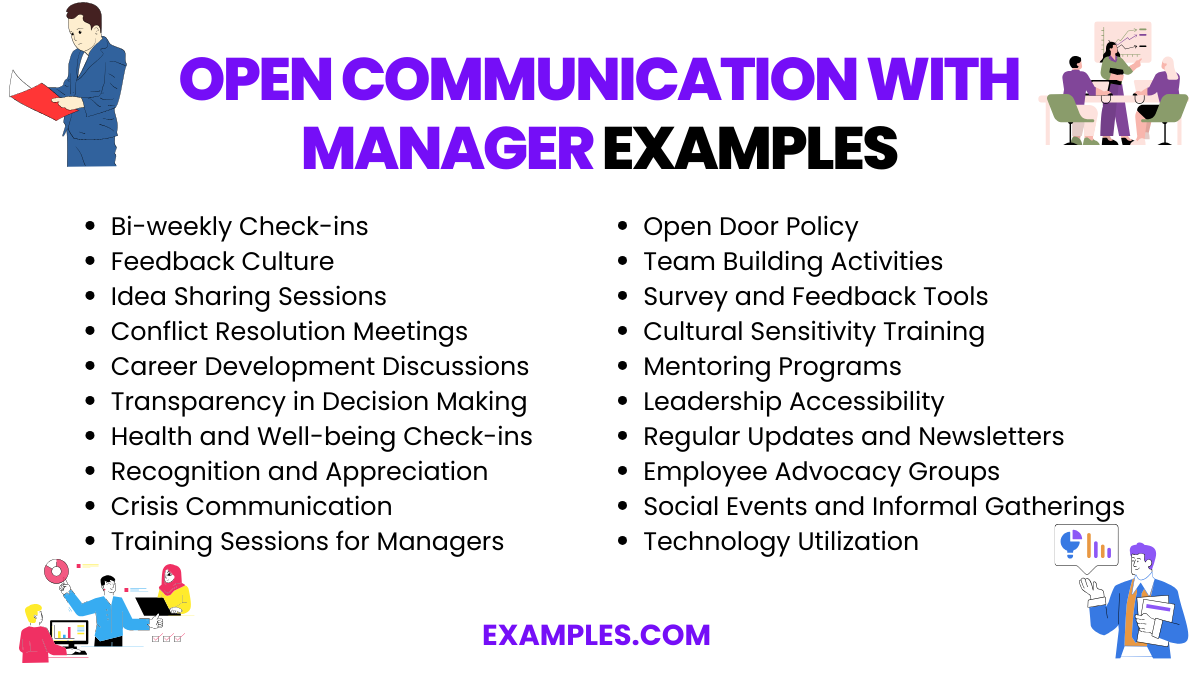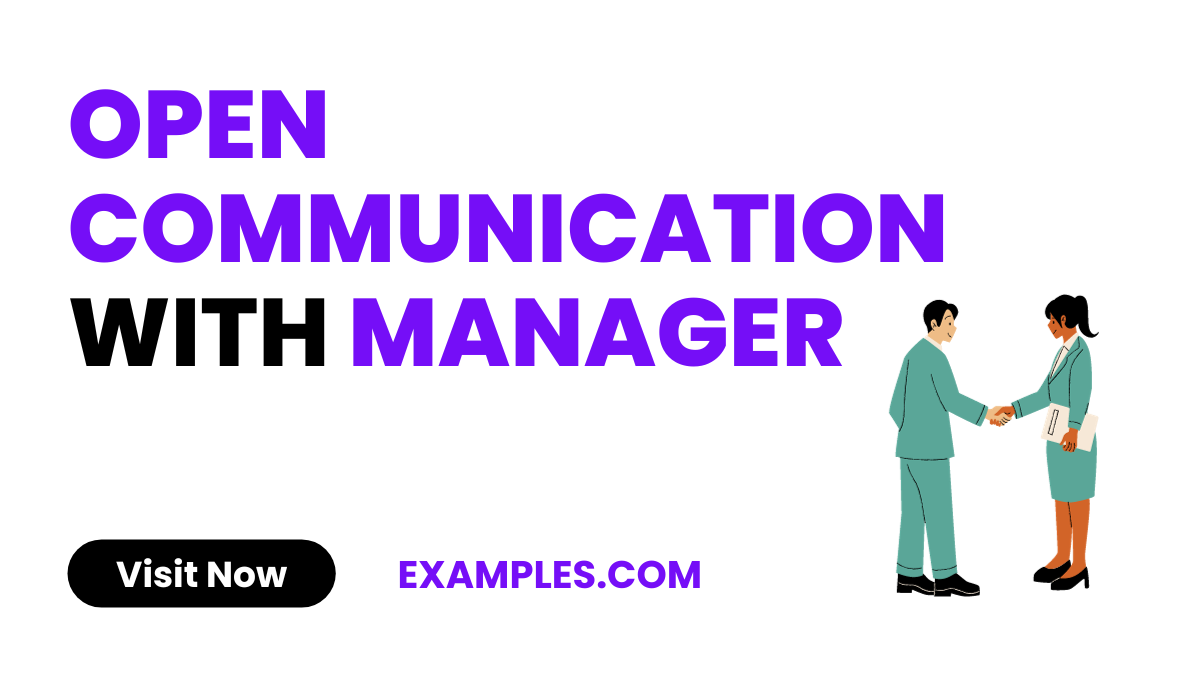20+ Open Communication with Manager Examples
In the modern workplace, open communication with a manager is pivotal for fostering a positive and productive environment. This guide illuminates the path to achieving transparent dialogue, emphasizing real-world Communication Examples. Dive into the nuances of effective manager-employee interactions, understand their significance, and discover practical examples that illustrate the transformative power of open communication. Enhance your managerial relationships and drive collective success with this comprehensive exploration.
Download Importance of Open Communication with Manager PDF
What is Open Communication with a Manager? – Meaning

Open Communication with a manager refers to the free and honest exchange of thoughts, feedback, and information between employees and their supervisors. It’s characterized by transparency, trust, and mutual respect, allowing for a non-judgmental platform where ideas and concerns are openly discussed. This type of communication encourages a collaborative and supportive work environment, leading to increased understanding, problem-solving, and productivity within teams.
What is the Best Example of Open Communication with a Manager?

The best example of open communication with a manager might be a regular, structured one-on-one meeting where both parties feel comfortable sharing honest feedback. In this setting, an employee discusses accomplishments, challenges, and professional aspirations, while the manager provides constructive feedback, recognition, and guidance. The key is a two-way dialogue where both sides actively listen, respect each other’s viewpoints, and commit to action items that drive personal and organizational growth. Such open exchanges cultivate trust, clarity, and a stronger working relationship.
20 Open Communication with Manager Examples

Discover the transformative power of open communication with these 20 distinct examples. Dive into scenarios where Open Communication and its principles significantly impact managerial relationships and workplace dynamics. Understand what drives each situation and how to foster or repair communication lines. This guide isn’t just about identifying the types of communication; it’s about creating a sustainable Culture of Open Communication at Workplace. Each example illustrates the Importance of Open Communication, offering insights into the causes and solutions, ensuring every professional can navigate and enhance their communication landscape effectively.
- Bi-weekly Check-ins: Regular meetings encourage Honest Communication. They prevent issues from escalating by providing a platform for immediate feedback and discussion. To foster this, establish a routine and open agenda where both parties can contribute topics.
- Feedback Culture: Cultivate an environment where constructive criticism is welcomed and valued. This enhances Open Communication in the Workplace. Encourage employees to give and receive feedback respectfully and constructively.
- Idea Sharing Sessions: Organize brainstorming sessions that welcome ideas from all levels. This promotes Open Mind Communication and drives innovation. Ensure all participants feel their contributions are valued.
- Conflict Resolution Meetings: Address conflicts immediately and openly. Open Communication in Relationship between manager and employee ensures issues are resolved through understanding and compromise.
- Career Development Discussions: Regularly discuss career aspirations and growth opportunities. This reflects the Importance of Open Communication in Relationships, fostering long-term professional development and satisfaction.
- Transparency in Decision Making: Involve team members in decision-making processes. This Open Communication approach makes employees feel valued and increases buy-in for decisions.
- Health and Well-being Check-ins: Especially important in Open Communication in Healthcare, regular discussions about well-being can improve morale and show care for individual team members.
- Recognition and Appreciation: Regularly acknowledge and appreciate good work. This positive reinforcement builds a foundation for Open Communication Benefits.
- Crisis Communication: Maintain clear and constant communication during crises. This is crucial for Why is Open Communication Important in Workplace, as it ensures everyone is informed and aligned.
- Training Sessions for Managers: Equip managers with the skills to communicate effectively, emphasizing the Importance of Open Communication.
- Open Door Policy: Encourage a culture where employees feel comfortable approaching management with concerns or ideas, reflecting the Open Communication Quotes ethos of approachability and receptiveness.
- Team Building Activities: Regular team activities improve relationships and communication, essential for Open Communication in Family and work family alike.
- Survey and Feedback Tools: Use tools to gather anonymous feedback, showing commitment to How to Promote Open Communication.
- Cultural Sensitivity Training: Ensures that Open Communication is effective across diverse workforces, respecting all backgrounds and perspectives.
- Mentoring Programs: Pairing employees with mentors encourages Open Communication in Relationship, providing a trusted avenue for professional and personal development.
- Leadership Accessibility: Ensuring leaders are accessible and approachable supports Why is Open Communication Important in Workplace, breaking down hierarchical barriers.
- Regular Updates and Newsletters: Keep everyone informed about company news and updates, fostering Open Communication in the Workplace.
- Employee Advocacy Groups: Support groups where employees can voice concerns and suggestions, embodying Open Communication Benefits.
- Social Events and Informal Gatherings: Casual settings can enhance Open Communication in Family style dynamics among team members.
- Technology Utilization: Use communication platforms and tools to stay connected and transparent, a modern approach to How to Create Culture of Open Communication at Workplace.
Open Communication with Manager at Workplace
Embrace Open Communication in Leadership for a dynamic and supportive workplace. This concise guide presents five distinctive examples of effective manager-employee dialogue. Each scenario underscores the importance of transparent, thoughtful communication in fostering a collaborative and adaptive work environment. Engage with these practices to enhance professional relationships and drive organizational growth.
- Leadership Town Halls
- Explanation: Facilitate regular updates and open Q&A sessions.
- How to Communicate: “Can you elaborate on how the new project impacts us?”
- Parental Leave Discussions
- Explanation: Discuss and support Open Communication with Parents around leave policies.
- How to Communicate: “I’d like more insight into the parental leave policy.”
- Child-Friendly Workplace Initiatives
- Explanation: Promote inclusivity with Open Communication with Child focused policies.
- How to Communicate: “How can I contribute to more child-friendly initiatives?”
- Transparent Performance Metrics
- Explanation: Ensure clarity and alignment in performance expectations.
- How to Communicate: “How do these new metrics align with my goals?”
- Flexible Working Arrangements
- Explanation: Advocate for flexibility to meet diverse employee needs.
- How to Communicate: “Can we discuss flexible schedule options?”
How Does Open Communication with a Manager Contribute to Personal and Professional Growth Within an Organization?
Open communication fosters a growth-oriented environment. It’s vital for personal and professional development. This section outlines how open dialogue with managers catalyzes individual and collective advancement.
- Enhanced Feedback and Learning Opportunities: Open dialogues enable continuous feedback, allowing individuals to learn, adapt, and grow quickly. Regular, constructive communication helps in identifying strengths and areas for improvement, facilitating a culture of continuous learning and development.
- Increased Engagement and Ownership: When employees feel heard through Open Communication with Colleagues, they’re more engaged and take greater ownership of their work. This sense of belonging boosts motivation and drives individuals to excel in their roles.
- Empowered Decision-Making: Open communication empowers employees to contribute ideas and solutions. This inclusion in decision-making processes not only refines their problem-solving and decision-making skills but also heightens their influence within the organization.
- Stronger Manager-Employee Relationships: Transparent communication builds trust and respect between managers and employees. This strengthened relationship encourages a more supportive and understanding work environment, conducive to personal growth and professional development.
- Career Advancement: Through open dialogue, employees can express their career aspirations and work collaboratively with their managers to identify opportunities for advancement. Open Communication vs Closed Communication clearly shows that an open environment provides more pathways for career progression.
What Impact Can Open Communication with a Manager Have on Workplace Culture and Overall Organizational Success?
The culture of open communication significantly influences the workplace environment and the organization’s success. Here’s how fostering open communication with a manager can reshape an organization.
- Promotes a Positive Work Environment: Open communication encourages a more positive and inclusive work environment. It reduces misunderstandings and conflicts, promoting harmony and collaboration among team members.
- Boosts Innovation and Creativity: An open dialogue encourages the sharing of ideas and perspectives. This diversity of thought leads to innovation and creativity, driving the organization forward in its goals.
- Enhances Employee Morale and Retention: When employees feel valued and heard, their satisfaction and morale improve. This not only enhances productivity but also contributes to higher retention rates. Open Communication with Students and younger employees especially appreciate a culture that values their input.
- Improves Crisis Management: In times of crisis, open communication is crucial. It ensures that everyone is aware of the situation and is working together towards a solution. This unity and clarity can significantly reduce the negative impact of crises.
- Drives Organizational Alignment and Success: Open communication aligns everyone towards common goals. It ensures that all employees understand the organization’s vision, mission, and values, leading to a more concerted effort in achieving success. Open Communication with Patients and clients further extends these benefits externally, enhancing the organization’s reputation and client satisfaction.
What are the Ways to Improve Open Communication with a Manager?
Improving open communication with a manager involves adhering to Communication Principles and establishing effective Communication Procedures. Here are steps to achieve this:
- Active Listening: Actively listen to your manager’s concerns and instructions, ensuring you understand their perspective.
- Clarify Expectations: Seek clarification on tasks and responsibilities to align with expectations.
- Regular Updates: Provide frequent progress updates, fostering transparency.
- Constructive Feedback: Offer and receive feedback constructively, focusing on improvement.
- Scheduled Check-Ins: Schedule regular check-in meetings to discuss goals and address concerns.
- Respectful Tone: Maintain a respectful and professional tone in all interactions.
- Conflict Resolution: Address conflicts promptly and professionally, seeking resolution.
- Documentation: Document key discussions and agreements for reference.
- Open-Door Policy: Encourage an open-door policy for approachability.
- Continuous Improvement: Continuously refine communication based on feedback and evolving needs.
Why is it Important to Have Open Communication with Your Manager?
Open communication fosters trust, clarity, and collaboration, enhancing workplace relationships and productivity. It’s crucial for mutual understanding and effective teamwork.
How Can Employees Actively Promote Open Communication with Their Managers?
Employees can schedule regular check-ins, provide constructive feedback, and actively engage in discussions to promote a culture of transparency and Open Communication vs Direct Communication.
Why is Open Communication with a Manager Important for Employee Success and Job Satisfaction?
Open communication ensures that employees feel valued and heard, leading to increased motivation, satisfaction, and commitment to the organization’s goals. It’s key for career progression and happiness at work.
In conclusion, fostering open communication with managers is pivotal for any organization seeking growth, harmony, and success. It not only benefits internal team dynamics but also significantly enhances relationships with external entities like Open Communication with Stakeholders. Embracing transparency, understanding, and continuous dialogue is the cornerstone for solving workplace challenges and propelling towards a more collaborative future.



